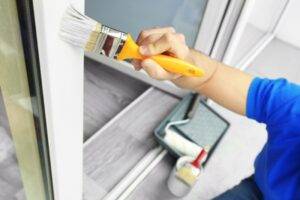


#janddhandyman #housepainter #handyman # #handymanrepairs #residentialconstruction #flooring #plumbing #carpentry #electricians #mansonry #homerepairs
🔎Hiring Professional Services
Hiring professional services for home repairs can be a great way to save time, money, and hassle. It is important to do your research before hiring someone, however, to ensure you are getting the best quality service at a reasonable price. Here are some tips for finding the right professional service provider for your home repair needs:
- Research potential contractors. Look up reviews online and ask family and friends for recommendations before making a hire.
- Verify licenses. Before you hire someone, make sure they have any necessary licenses or certifications required in your area.
- Consider using a handyman service. These services provide access to multiple skilled workers who can tackle multiple tasks around the house without having to hire separate specialists for each job.
- Read up on home repair topics that you are unfamiliar with so you know what questions to ask when selecting a contractor or assessing their work when it is done.
- Ask potential contractors how they will handle any unforeseen problems that may arise during the project and how they will handle additional costs if needed due to unexpected issues or materials needed during the process..
- Compare prices among different contractors and get written estimates of cost
🔨Understanding Your DIY Skills
If you’re a homeowner, chances are you’ve had to tackle some home repairs. From changing a light bulb to replacing your roof, understanding basic DIY skills can help save time and money.
Caulking, patching drywall, painting, and fixing a running toilet are just some of the skills everyone should learn when it comes to home maintenance and repair. With these skills, you’ll be able to repair broken items around the house without having to call in a professional or overpay for services.
You don’t need an extensive background in construction or engineering to learn how to complete basic home repairs yourself. You can find plenty of tutorials online that will teach you how to use a cordless drill/driver, change your vehicle’s oil and oil filter, maintain your heating and cooling system, stain wood furniture and more.
If you decide that buying a fixer-upper is the way for you to go as an investment property or rental unit down the line, then having basic DIY skills will be invaluable in bringing it up to code and making it rentable.

🔋☀️Prioritize Repairs According to Urgency
New homeowners often face costly home repairs, even if money is tight. To avoid overpaying for repairs, it’s important to prioritize projects according to urgency. First, build an emergency fund so you have cash readily available in case of an unexpected repair. Then, focus on correcting any wiring or electrical issues as they can be a safety hazard. Review customer recommendations and online reviews for contractors in your area; asking neighbors for references can also be helpful. If needed, tap into a home equity line of credit or loan to cover the costs. If a major repair is necessary (e.g., leaky roof), speak to an experienced contractor who can tell you what needs to be fixed and the order of priority; safety items should always come first! Lastly, make sure you are not overpaying by researching the estimated repair value of your house before committing to spending more than necessary on repairs and renovations.
Do Research and Compare Prices
🗞️Doing research and comparing prices before buying a home is an important step in avoiding overpaying. Before making any decisions, it is important to research the current market conditions and compare prices of houses you are interested in. First-time homebuyers are more likely to overpay on their house due to a frenzied sellers’ market. To avoid this, look for signs of overpayment like properties sitting on the market for longer than average or prices higher than similar homes in the area. Additionally, consider buying fixer-upper houses at lower prices and renovating them to enjoy or sell. This can be done through researching the 70% rule of house flipping and understanding what repairs need to be done in order to make a profit. Appraisals are also helpful when determining if you are not overpaying for a home as they ensure that mortgage lenders do not approve loans for more money than what the property is worth. By researching and comparing prices before committing, you will be able to buy your dream home without overpaying!

Be Mindful of the Tools You Need
Having the right tools is essential when it comes to tackling home repairs. Without the correct tools, you may find yourself in an endless loop of trial and error, not to mention spending more money than necessary. Being mindful of the type of tools you need can save you a lot of time and frustration during your DIY project.
Before starting any home repair project, make sure that you have all the necessary tools. This means having everything from screwdrivers, wrenches, pliers, hammers and drills to knives, saws, sanders and measuring tapes. It’s also important that these items are in good working condition as worn or broken tools can be dangerous and could cause further damage to your property.
You should also consider investing in specialty tools for certain projects such as plumbing or electrical work. Specialty tools may be expensive but they will increase the safety of your DIY projects so it’s worth considering for more complex repairs.
Finally, take the time to learn how to use each tool correctly and safely before attempting any repairs on your own. There are plenty of tutorials online that will help you gain some knowledge on how each tool works so take advantage of this free resource! With the right
Understand Local Building Codes and Regulations
Understanding local building codes and regulations is essential for any home repair project. Building codes exist to ensure that all residential and commercial buildings meet a set of minimum standards that provide safety, comfort, and convenience for the occupants. Local building codes are enforced by local governments and may vary from one jurisdiction to the next. It is important to be familiar with your local regulations before beginning a home repair project, as failure to comply can result in costly fines or even demolition orders.
When planning a home repair project it is important to consult the applicable building code in your area. Building codes describe minimum requirements related to structure, fire safety, accessibility, plumbing, electrical systems and more. They also contain specific instructions regarding the installation of materials such as lumber or drywall. In some cases they may also require additional permits or inspections prior to construction or renovation.
It is also important to understand the Uniform Federal Accessibility Standards (UFAS) which cover accessibility for disabled individuals in all public buildings built after 1991. These standards include guidelines for door widths, ramp slopes, stair handrails and more that must be met so that disabled individuals can access the space without difficulty.
Finally it is important to note that changes made during remodeling projects
Utilize Online Resources for Expert Help
Online resources can be a great way to get expert help for home repairs without overpaying. With a variety of websites and platforms offering advice on how to tackle projects, you can save time and money by doing it yourself.
One of the best online resources is Family Handyman. They offer books, articles, videos and other tools to help you with home repairs or modifications. Additionally, they provide detailed step-by-step guides that make DIY projects easy to complete.
You can also consult customer reviews when searching for contractors or services related to home improvement. These reviews may provide insight into the quality of work provided by a given contractor or company, and give you an idea of what others are saying about their services.
For more in-depth information related to your DIY project, EBSCO’s Home Improvement Reference Center is an excellent resource. This platform provides access to thousands of articles from journals, magazines and newspapers that cover topics like remodeling techniques, maintenance tips and much more!
Finally, if you’re struggling financially due to unexpected repair costs, there may be help available through federal assistance programs or local non-profit organizations that specialize in providing aid for homeowners in need.
Get Creative with Inexpensive Solutions
When it comes to home repairs, you don’t have to break the bank. There are plenty of creative and inexpensive solutions that can save you money and still look great in your home. With a little bit of research and some elbow grease, you can make your home repairs cost-effective and ensure that your property maintains its value.
For starters, consider DIY projects like painting walls or refurbishing furniture instead of hiring a professional. You can also get creative with materials by scrounging for free or cheap items like wood pallets or reclaimed lumber. For larger projects, do your due diligence before getting a fix-and-flip loan and discover digital products to help make the process easier.
To reduce costs even further, use materials such as undiluted white vinegar or bleach solution (one cup bleach & one gallon water) for cleaning instead of buying expensive supplies at the store. Finally, crown molding is an easy way to add elegance to any room without spending too much money—just be sure to do the job right so it looks professional when finished.
Reuse Materials Where Possible
Reusing building materials is a great way to reduce the amount of waste going to landfills and can potentially save you money too. There are many ways to reuse old materials, including complete deconstruction, buying used items, and donating unused items. Reuse is preferred over recycling because it consumes less energy and resources.
Some examples of reclaimable building materials include doors, windows, wood flooring, and much more. Home improvement stores and donation centers often sell new and gently used furniture, appliances, home goods, building materials and more that could be reused in a project. Other ways to reuse include using old shoe planters for outdoor gardens with reusable materials or using reusable shopping bags instead of plastic ones when going shopping. Taking steps towards reducing your own plastic usage is also beneficial for the environment.
By taking the time to reuse existing materials whenever possible in your home repairs or renovations you are not only helping the planet but also potentially saving money as well!
Check for Warranty Coverage on Appliances
Many appliances come with a warranty that covers certain repairs for a period of time. It is important to read through the terms and conditions of a warranty carefully to understand what is covered and for how long. Checking for warranty coverage can help you save money on repair costs in the event that something breaks or malfunctions.
When purchasing an appliance, check if the manufacturer offers any warranties or extended warranties. It is also important to check if any local retailers offer additional coverage. If so, compare the terms and conditions to determine which one offers the best protection for your needs.
It is also important to review your existing warranties periodically. This will help you ensure that all items are still under warranty and will remind you when it’s time to renew or replace them. Always keep copies of all documents associated with your purchases; this includes receipts, warranties, and anything else related to your purchase.
In addition, keep track of any repair or maintenance work done on the appliance while under warranty as well as any updates made by the manufacturer during this time period. This information may be helpful if you need to make a claim later on down the road.
Look Out For Promotions or Discounts
Saving money on home repairs can be a challenge, but with the right knowledge and resources it’s possible to get the job done for much less than you would expect. One of the best ways to lower your costs is to look out for promotions or discounts from local businesses or contractors.
Many companies offer special discounts to customers who use their services regularly or who are willing to pay in advance for a certain amount of work. Local hardware stores often have sales on certain products, and some contractors may even offer free estimates if you contact them directly.
In addition, many cities and towns have programs designed specifically to help residents find discounts on home repairs. Look online or check with your local government office for available programs that provide reduced-price repair services or materials. You may also be able to find financial assistance programs that provide grants or loans specifically designed to help low-income families cover the cost of home repairs.
When shopping around for deals on home repairs, always make sure you read all fine print carefully before signing any contracts. Be sure that you understand what services are included in each price quote and double check that any warranties offered are valid in your area before agreeing to any deal. With a bit of research
Conclusion
Home repairs can be costly, but there are ways to minimize and manage the costs. Prioritize repairs and maintenance, shop around for the best prices, and research contractors before hiring. When selling a home or making large purchases, be sure to budget what you can afford so you don’t overpay. Lastly, extended warranties are available to protect against potential problems that may occur with your home, car or appliances. With a little bit of foresight and planning, managing the cost of home repairs doesn’t have to break the bank!
Learn More About The Advantages Of Hiring J and D Handyman
Budget Web Solution
Leave a Replay










